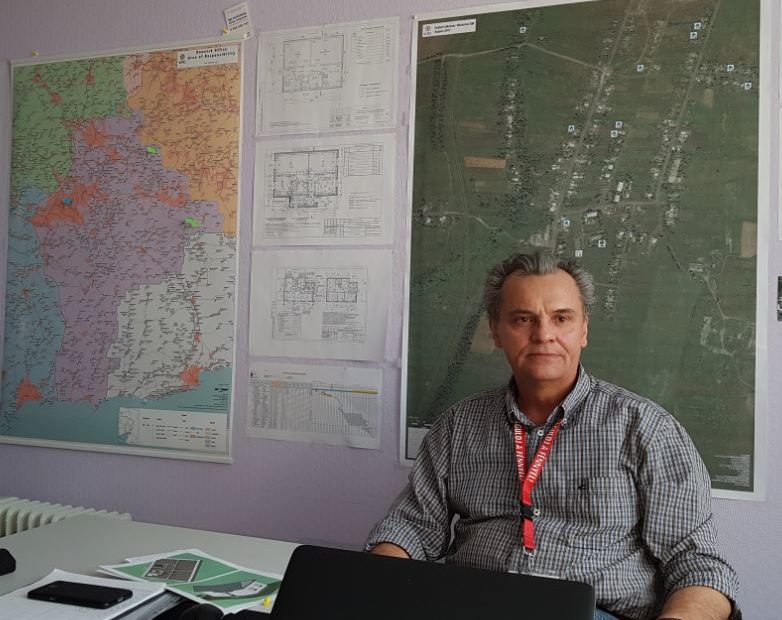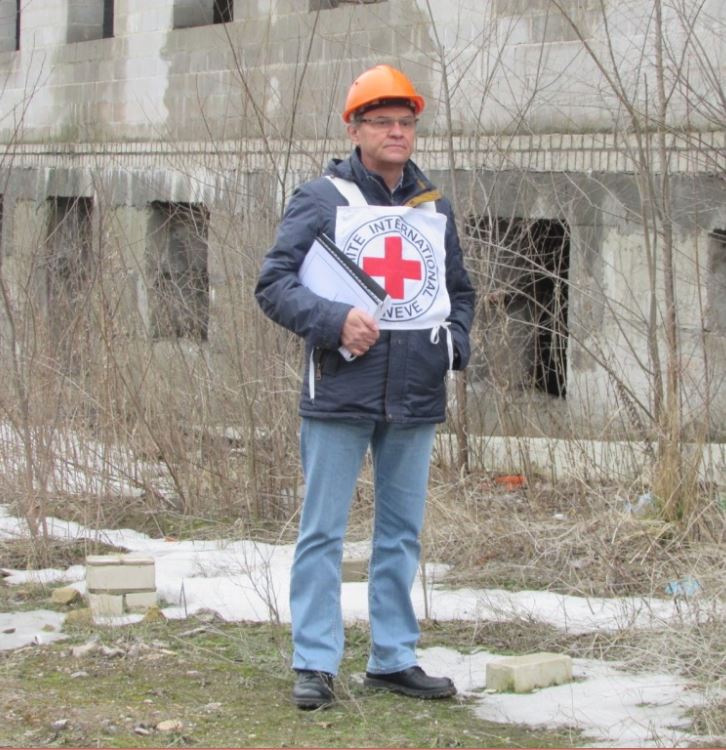Karoly Korcsmar is an engineer working in the ICRC office in Donetsk.
Karoly, when and how did you start to work for the International Committee of the Red Cross?
I started with the ICRC in June last year. This is my very first mission, and I had never worked for an international non-governmental organization before. My last project in Azerbaijan, completed two years ago, was in the private sector, after which I started to look for new opportunities abroad,. It was actually my daughter who found this ICRC job vacancy for me, and I immediately saw that I could be the right fit for it as they were looking for a Russian-speaking civil engineer. After the first job interview, I was offered this position in Donetsk. It was not by chance that my daughter sent me the link, because she has been working in the international humanitarian sector for several years, and is now in Sudan. I thought to myself: if my daughter can do it, why couldn’t I?
What is your educational and professional background prior to the ICRC?
I am a structural civil engineer, trained and educated in Hungary. After graduating, I started working as a design engineer with a well-known institute in the field of water and sanitation in Hungary. From there I moved on to be a field engineer on an oil and gas development project in Kazakhstan. I stayed in Kazakhstan for six years and thoroughly enjoyed the experience: a vast country, a multicultural team, a new language… much more challenging and exciting than just working in my home country. I had known the Russian language from my studies, as it used to be the primary foreign language in Hungary at that time. After Kazakhstan, I joined a global Canadian company in the field of modular construction, focused on Russia, Uzbekistan and Tajikistan, and I travelled to those countries on short-term projects. I even made it to the Sakhalin Islands!
How do you compare your ICRC experience to your private sector experience?
What the Water and Habitat Department does here is comparable to what I used to do in private companies. Large companies have their own procedures on how to develop and execute projects, which cover the same basic steps one can find in the ICRC’s construction projects. The big difference is the clients: before I used to work for the benefit of large state companies, oil corporations… while nowadays I have many more clients, if you count all the beneficiaries of our projects across the Donetsk Region. There is much more personal touch and direct contact with the beneficiaries here than in my previous jobs: when you reconstruct someone’s home, which was damaged in the conflict, you develop a special bond with that family
What projects are your working on now?
There are three major projects I am currently working on, all located in Nikishyne, a small village in the locality of Debaltsevo, which was heavily damaged during the heavy combats in 2014-2015. These projects include rehabilitation of an ambulatory building, rehabilitation of a kindergarten, and construction of a new boiler house to supply heat for these two buildings. In addition, we plan to fully reconstruct ten houses that were destroyed during the conflict. I am also working on the rehabilitation of the medico legal bureau office in Donetsk located in an old medical facility building that was damaged during the conflict while developing a proposal to complete the construction of another medical building that could house the whole medico legal department.
My team here is my greatest driving force: they are proactive, dedicated, they work hard, and we all still know how to relax and unwind. I also like that my job is not only office-based, and it is very gratifying when you see final, concrete results of your work. On several occasions we have received thank-you notes from people we help, and then we know that we did it right.
And how do you find living in Donetsk, how is your life outside of work?
I live in the city center, which is quite a nice area. I like watching movies, reading and I keep regular contact with my family. My daughter is in Sudan, my son in Germany, and my wife in Hungary! I also have the chance to enjoy the culture that this place has to offer, such as museums, the drama theatre or the philharmonic orchestra. I am still looking for a place where I can do bowling, which is one of my passions. I share a flat with another colleague, so there is always something to do and someone to talk to after working hours.
What would you recommend to those who consider joining the ICRC?
Just try it! If you are an engineer, you will use your technical knowledge, as you did in the private sector, but you will have that special feeling when you receive positive feedback and appreciation from the beneficiaries whom you meet when their whole world has been severely impacted by conflict. I am really happy to have made this decision, and I am very thankful to my daughter for directing me this way.


